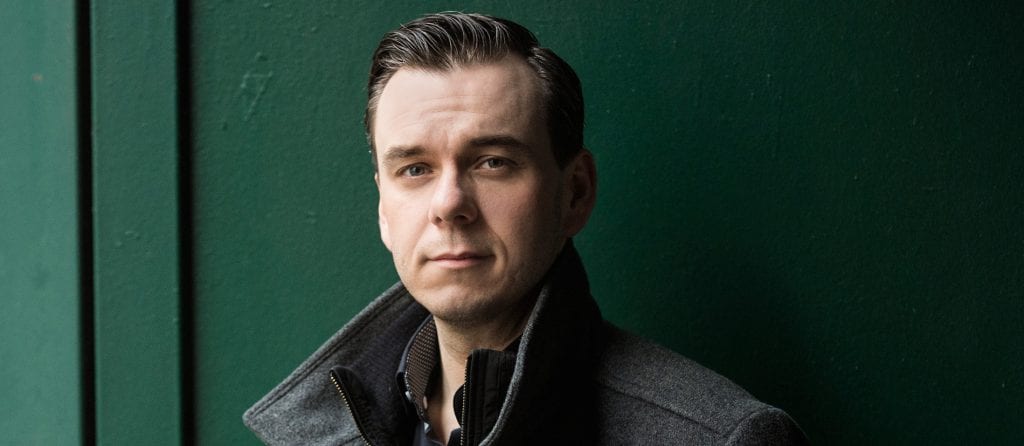At 32, the young tenor, Benjamin Bernheim, made his debut at the Royal Opera House in Richard Jones’s new production of Puccini’s passionate opera La Bohème on the 6th October 2017.
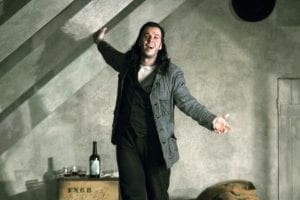 We met at the Royal Opera House a few days before his debut appearance in the much-coveted role of Rodolfo in La Bohème. His excitement seemed complete. Not only is he appearing at leading Opera Houses, but also in the role he is so keen on.
We met at the Royal Opera House a few days before his debut appearance in the much-coveted role of Rodolfo in La Bohème. His excitement seemed complete. Not only is he appearing at leading Opera Houses, but also in the role he is so keen on.
Benjamin Bernheim was born in Paris, grew up in Geneva and studied in Lausanne. In 2009 he moved to Zurich, where he was part of the Young Artist Programme until 2014/2015. Looking the future in the face, he realised that staying in a comfort zone with a high quality lifestyle was no longer challenging: “I needed to jump into the unknown. Staying at the same place was not possible for me. I needed to get out, to take risks”. So, he did.
Bernheim went freelance. Advised by Alexander Pereira, the then Zurich Opera House director, he hired an agent. Auditions and debuts in leading opera houses followed.
“He gave me the chance to introduce my voice and my artistic personality to the audience”.
After three years, once again there is a need to change to a new repertoire “my problem was that I was just locked into German repertoire – my problem was my German sounding name, people were talking to me in German without even finding out where I was from. It was very hard to make people understand that I’m French, also Swiss, but my central repertoire is the French and the Italian. I want to touch all the repertoire possible, not just the German one. If you are, as in my case, doing this kind of work in Germany, which is amazing, there is a lot of work. Every house in Germany, every city in Germany with 50,000 inhabitants, has an opera house with a choir. So there is a lot of work, which is great, but it was blocking me.”
Bernheim looks to the romantic lyric repertoire as a more befitting one for his voice at this stage of his career. “It was not easy to convince everyone that the German repertoire is limiting my future prospects”: he is eager to explain the reasons for his constant aspirations for a change, for a new challenge. Once again, focused on his ambition and understanding of his abilities at this stage of his life, he took the chance with all the risks and “exactly two years ago, in 2015, I met another agent in London”. The agent offered the young tenor opportunities to change direction. Auditions followed which paved the way to performances in 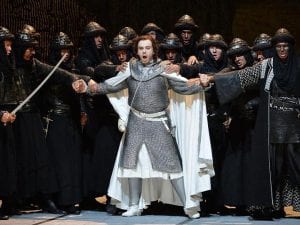 leading Opera Houses in Europe in roles such as Narraboth (Salome), Lensky (Eugene Onegin) and Alfredo (La Traviata) Rodolfo (La Bohème), Tamino (Die Zauberflöte), to name but a few. He has his inspirations and aspirations but is aware that the reality of the business may not always conform with them.
leading Opera Houses in Europe in roles such as Narraboth (Salome), Lensky (Eugene Onegin) and Alfredo (La Traviata) Rodolfo (La Bohème), Tamino (Die Zauberflöte), to name but a few. He has his inspirations and aspirations but is aware that the reality of the business may not always conform with them.
Benjamin Bernheim: “I want to sing Lohengrin one day, but not at this point of my career. I want to sing the French, Italian and Russian repertoire before moving on to the German repertoire.”
Reflecting on the different repertoires, he adds “there is a gap between Tamino and Lohengrin. The German repertoire lacks roles equivalent to Alfredo (La Traviata) or Rodolfo (La Bohème), Roméo (Roméo et Juliette).”
Rivka Jacobson: “For people who don’t know much about opera, can you elaborate what do you mean when you talk about ‘a gap’ in the German repertoire.”
BB: “I think for the evolution of a voice, to sing too early very heavy repertoire, such as roles in Wagner’s opera as opposed to parts on offer in operas by Puccini and young Verdi. It is like a hike in the mountains. Some of Wagner’s opera parts are very long like a marathon, so you need to have a very good knowledge of your voice, how long you can sing in full voice, how much energy you can give in long phrases. But you can take it, you can deliver it, just as in sports when very young players are able to play for 90 minutes on pitch. It’s amazing, but at the very highest level, there is a right way to go up, and for me, singing Wagner and Strauss too early was just too heavy for my voice to carry. Naturally, some singers, can manage repertoire with long roles while others take time to allow their vocal chords to develop.”
The role of Rodolfo that Bernheim is about to take on at the Royal Opera House is his favourite.
RJ: “Why?”
BB: “Because it’s a role that gives me the largest amount of possibilities to show the colours of my voice; it’s young, it’s romantic, it’s powerful. And it’s also sometimes, very dramatic. But the whole palette of colours that Rodolfo offers to the singers is really large. In the third act everything is open. You saw the production. The orchestra is very loud. It’s a very heavy moment. But the first act is very youthful. It’s very sparkling. It’s young; it’s fresh. It shifts gears quickly; and it’s fantastic because in this role, in Rodolfo I have the possibility to show many facets of my artistic personality. I’m very lucky.”
RJ: “Do you enjoy acting?”
BB: “Yes I enjoy acting, I also enjoy the fact I’m moving from opera house to opera house to do the same opera. I’m doing now La Bohème, I did it in Zurich, in Dresden, now in London, then in Paris.”
RJ: “And all of them in the role of Rodolfo?”
BB: “Yes, all in the role of Rodolfo, but all of them with different casts. Mimi, the lead female character, with whom Rodolfo has a passionate relationship, is of course different in every production. So, every voice, every singer that I meet, when we sing together it brings a new possibility of colours, you know, when you begin to let the voices mix together at the rehearsals and you feel “wow” this is a bigger voice, or this is a smaller voice, this a delicate voice, or this a sexy voice, this is a strong voice. There are as many different colours as there are kinds of singers; everybody has a different voice, and this is what is rich in this business and in this world of opera, that I never know who it’s going to be….”
RJ: “Who is going to be your lover?”
BB: Well, you never know, but sometimes you know their names in advance. Of course, in ten years from now I will know more and more singers so I will discover fewer new names, but now, this is the beginning of my good career, in this repertoire, so I’m meeting a lot of new people.
RJ: ”The score may be conducted and performed superbly, but on stage the leading singers’ acting skills may fail to convey the dramatic plot convincingly. The common error, in love scenes is that he tells her how much he loves her while fixing his gaze on the auditorium, as if she is not there.”
BB: “Well, that is the big challenge of the stage director first, the big challenge of these pieces because they are composed so it has to be sang, it has to be heard, it has to be listened to, and also maybe it’s because the new generations of singers now have to be better actors than they used to be, now we are more marketing products. We evolve in this world of new technologies and pictures and social media so we have to be more complete than before. Before we simply needed to be good singers, we were judged mainly on our voices, and now we are judged on how we look, how we talk, how we interact with others, how we look together as a couple, maybe suddenly a singer and a tenor and a soprano would look amazingly together so we will try to put them together all the time because there is chemistry, like there was between Rolando Villazón and Anna Netrebko. At the beginning of their career, it’s like wow, they were the couple. So, we play, we act, we have to go deeper into the history, into the psychology of the characters. We are not slaves of the singing, but, unfortunately, we are not as free as actors because we have to sing these things; we cannot sing when we are like this, or in any crazy position, we have to be able to sing, it has to be comfortable, because the act of singing is a difficult thing to do, especially when you do long roles. It is for the director to show the singer wider options of presenting his role and in helping create a dramatic dynamic on stage.”
RJ: “Performing Rodolfo in different opera houses, do you find that in every production the interpretation of the character and possibly the opera feels different?”
BB: “Absolutely, especially today. The details are the same, it is what it is. But an opera director can bring a lot of different colours. I did a new production in Zurich where the angle of approach was totally different from what I see here.”
RJ: “In what way?”
BB: “Covent Garden’s new production, directed by Richard Jones, tells a story. We sing a story to bring the audience to understand what it is to be young and what it is to be afraid to lose someone or to face that fact that someone could be losing someone, and I think he has been really working in detail about this. I really like it because it tells a story, because what I did in Zurich was more personal for the opera stage director who did something, he told the story of Bohème, but it was more in his vision of Bohème in his concept everything happened in Rodolfo’s head. So, it was all an idea of him dreaming of this woman, dreaming about the people in the café, it is all in his head, a big dream, nightmare and he is trying to find his way in it. It is defensible, but the problem is that it is sometimes difficult for the audience to follow it as you are not prepared to see what you’re going to see. It is hard to bring complicated ideas to an audience that is likely to see it once. We singers rehearse it for weeks, so we have time to see all the details. I think the point of a stage director is to make sure that people who will see the opera only once will get as many of different details as possible, so that the plot unfolds in a comprehensible way. It is a journey.”
RJ: “A journey?”
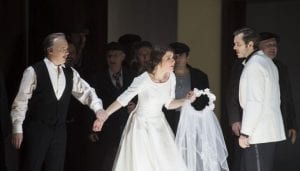 BB: “You bring the audience on a journey and they either like it or not. It is, in my opinion, for the singer and stage director to highlight the details without being annoying or boring. There is an intelligent way to bring audience on a journey. The audience consists of people who love opera, go to opera every week so they are used to this vocabulary of reading the details and some others will say, “I go to the opera house twice a year and I need to think about something else, I am a lawyer, I am a banker, and I am curious about things..” but we have to know as a singer, actor on stage that a lot of different people come to the opera house and all of them need to get as many details as possible.”
BB: “You bring the audience on a journey and they either like it or not. It is, in my opinion, for the singer and stage director to highlight the details without being annoying or boring. There is an intelligent way to bring audience on a journey. The audience consists of people who love opera, go to opera every week so they are used to this vocabulary of reading the details and some others will say, “I go to the opera house twice a year and I need to think about something else, I am a lawyer, I am a banker, and I am curious about things..” but we have to know as a singer, actor on stage that a lot of different people come to the opera house and all of them need to get as many details as possible.”
RJ: “How much does the shouting of ‘Bravo’ impact on the singer?”
BB: “Actually, sometimes it is complicated when, you’re in a role or into your character and you try to focus on a story, it is very difficult. Most of the time it is a relief to hear the ‘Bravo’ because you hear that you pleased the audience. The problem, and that’s the big risk, is that you get out of your character. The most difficult thing is to stay focused when you are applauded at the end of an aria. To stay focused, as if the audience does not exist, there is a wall. We have to be careful a bit. We learn that with time. We have to stay in our bubble, this is part of the show.”
RJ: “Alfredo and Rodolfo – passionately in love. Which of the characters is more fun to perform?”
BB: “For me as a singer, Rodolfo has two years’ head start on Alfredo. I have had only one production of La Traviata; it was very fast. I had three days of rehearsals, one stage rehearsal and then the performance. I didn’t have time to go into the character in that production but of course I can say that one is more difficult than the other, I think the character of Rodolfo is again more sparkly, more impetuous, in a way a bit sexier.”
RJ: “Would you say Alfredo is a boring character?”
BB: “Alfredo could be seen as a boring man. But Alfredo has a beautiful soul, that is very shy and does not know how to express things. He will go to the door of Violetta for a year knowing that she is sick. He does not know how to say ‘I love you’, how to please a woman, he is the son of his father, he is highly protected and it is hard for him to face the reality of the world, all these people going to parties and playing the hard game of society. I think Alfredo is also like Onegin in Tchaikovsky’s opera: these people are beautiful characters, beautiful souls, maybe they do not fit into society, they are very romantic inside, a woman is their whole world. There is life around, but all they can focus on is that she is beautiful, ‘I love her. She is my whole world. Nothing else but her exists in this world’. This is beautiful but also a very naïve perspective. Rodolfo is more sparkly, and sexier because he is a character who knows more about life.
RJ: “Which of the two is more challenging to sing?”
BB: “I would say for me it is easier to play Rodolfo because that role fits more my personality. I should not just play any role. For example, I would love to sing Lensky in Onegin because of my personality but I could work on this character very well. Now Rodolfo is easy because I have sung it a few times. I am used to it. Alfredo, maybe in two years I will give you another opinion, maybe it will the same.”
RJ: “Your next production is where?”
BB: “After Covent Garden I go to Opera National de Paris because there will be a new production of La Bohème by the German director Claus Guth. He has been directing many productions in Paris; almost every season a new production.”
RJ: “Do you find it easy to sing in Italian?”
BB: Yeah, as singers we must have this flexibility of being able to imitate accents, to sing Italian as if we were Italian. So it is not difficult. I had to work really hard when I had to sing in Russian. People thought I was Russian because when I spoke Russian I had a very good accent. For me it is not difficult; it is a matter of flexibility of mind, listening to a lot of different versions, not going to only one version with one accent, but having an opinion based on different regions. Then you can make your own mix.”
RJ: “Are you good at languages?”
BB: “I am, but I don’t speak them fluently, I need to be in Italy for a few 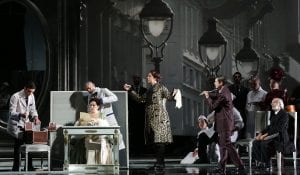 weeks before I speak the language. German is more obvious because I live in Zurich, so it helps; and French is my mother tongue.”
weeks before I speak the language. German is more obvious because I live in Zurich, so it helps; and French is my mother tongue.”
RJ: “The near future?”
BB: “All my contracts are already signed for the next three years. We all sign contracts years in advance. I know where I will be these coming years, so I just want to go on evolving my repertoire of young lyric romantic tenors and seeing how my voice develops itself in different opera houses and acoustics, and hope that I can keep it young and cheerful.”

